- Home
- Julie Smith
Huckleberry Fiend Page 7
Huckleberry Fiend Read online
Page 7
“So tell me,” she said, as if nothing had happened, “what was the big deal about the Post-It?”
Striving for maximum drama, I’d told her the whole yarn except for that. I produced the yellow note: “Just have a look at it.”
“Pamela Temby. You could get saccharin poisoning just from the name.”
“Look at the other names. Carefully.”
“I never heard of Wolf and Kittrell. Sarah Mary Williams could be anybody.”
“Listen to this.” I got my new copy of Huck and turned to the relevant passage.
* * *
“What did you say your name was, honey?”
“M-Mary Williams.”
Somehow it didn’t seem to me I said it was Mary before, so I didn’t look up; seemed to me I said it was Sarah; so I felt sort of cornered, and was afeared maybe I was looking it, too. I wished the woman would say something more; the longer she set still, the uneasier I was. But now she says:
“Honey, I thought you said it was Sarah when you first come in?”
“Oh, yes’m, I did. Sarah Mary Williams. Some calls me Sarah, some calls me Mary.”
* * *
It sent Sardis to Memory Lane. “That’s when he disguises himself as a girl,” she said. “But then he gives himself away because he can’t thread a needle, right?”
“Or throw or catch like a girl.”
“So, really, when you get right down to it, it’s another name for Huckleberry Finn. Like a code name.”
“That’s what I think. Beverly wasn’t any fluffbrain— or if she was, at least she was one who’d almost certainly read a major work like Huck. I think she picked the name to appeal to Twain collectors. Look here.” I pointed to the way she’d repeated variations of it on the Post-It. “I think she was doodling while she made her phone calls, trying to figure out which version would go down better.”
“Ah. And you think the people on the list are collectors— potential buyers for the manuscript.”
“That’s right.”
“But— Pamela Temby?”
I shrugged. “Just because she can’t write doesn’t mean she can’t read. Anyway, I shouldn’t say she can’t write. I’ve never read a word of hers.”
“Lifestyles,” said Sardis, making a face, “of the rich, famous, dissolute, and revolting. But anyway— assuming she’s a collector— what about the other two? Have you ever heard of them?”
“No, but I’m an ace reporter, remember?”
“Just for the sake of interest— how does an ace reporter track down a name out of the blue?”
“Easy. Gets someone else to do it.”
The someone I had in mind was Debbie Hofer, who really was an ace, and more important, was currently employed, with access to clips. If Wolf and Kittrell were rich enough to buy the Huck Finn holograph, they’d probably made news at one time or another. I had a lot more confidence that I’d find them than that I’d find the manuscript.
Sardis was still with me when Blick turned up the next morning. It would have been a good excuse not to invite him in, but she threw on her caftan and fled. Stepping over my threshold, Blick let his potato face take on a sneer. “Nice place.”
Dammit, it was a nice place, but the words didn’t go with the sneer. Was he actually trying to be polite (and failing), or was he being sarcastic about my furniture? “Can I make you some coffee, Howard?”
“You can tell me what you know about Beverly Alexander.”
“I already told you. Nothing and zero. Zip and doodley-squat.”
“What’s this?” He picked up the Post-It from the coffee table.
“None of your damn business.”
“Pretty fast company you’re keeping. Pamela Temby a friend of yours?”
“Howard, would you mind stating your business? I’ve got things to do.”
“Yeah? Like knocking out one of those blockbusters? I guess your public’s waiting, huh?”
“Did I ever tell you you look like a potato?”
“Somebody hit Isami Nakamura last night.”
“Excuse me?” For a minute I thought he meant Isami’d been in an accident. But that couldn’t be because I’d left her asleep. If he was trying to gauge my reactions, it was a good thing I was slow on the uptake.
“A burglar hit her— for the third time this week.” (Technically the second, but I didn’t feel like correcting him.)
I said, “That seems like too many coincidences.”
“There’s another interesting little coincidence.” Blick walked into the dining room, got himself a chair, brought it back, and sat down.
“Make yourself at home, dildo.” I sat on the rumpled bed.
“Listen up, douchebag. Miss Nakamura thought she heard a noise. When she got up to investigate, she found her back door unlocked. Nobody was in the house, but she had this weird feeling somebody had been. See, she could especially remember locking the door— on account of the two other burglaries, one of which, if you’ll recall, resulted in the murder of her roommate. And she happened to remember something— know what that was, jerkoff?”
“Haven’t the foggiest.”
“When she came in last night, she saw a light-colored Toyota parked down the street. She couldn’t help noticing it was just like yours.”
“Mine? But how could she know mine?”
“That little call you paid on her. Don’t you remember how you parked across the street? She and I were talking in the living room at the time— and she happened to look out the window and notice you getting out and walking up to her door.”
“Howard, for Christ’s sake! How many light-colored Toyotas are there in the world?”
“It’s kind of coincidental, don’t you think? This mysterious stranger shows up for no explainable reason, with a pillow in his jacket, like some kind of half-assed disguise, and a few days later she sees his car and she gets burglarized.”
Now he had me going. Not because there was any chance in hell he could connect me with the burglary, but because he’d said “mysterious stranger.” Surely that couldn’t be a coincidence.
“Did you know,” I said, “that Mark Twain wrote a story named that?”
He looked as confused as a potato can. “Named what, asshole?”
“ ‘The Mysterious Stranger.’ Several stories, actually. Don’t you think it’s kind of coincidental you should use that phrase?”
“Mcdonald, you want to spend a few hours at the Hall?”
“Just pointing out that life is full of coincidences.” (He didn’t, I was now convinced, know the half of it.)
“You want to tell me how you know Beverly Alexander?” I did. The hell of it was, I was dying to. As little faith as I had in Blick as an investigator, I had the sense to know I was concealing evidence. But I couldn’t incriminate Booker and, anyway, I had no manuscript to support the story. True, I had the Post-It… my eyes strayed to the coffee table. It had mysteriously disappeared.
“How I know her is, she left a message on my machine. Do you want to tell me why you’re so eager to get Pamela Temby’s unlisted number?”
He turned red, though not, I’m sure, with embarrassment. He was mad. “What are you talking about?”
“You want my list of phone numbers, you get a search warrant.” I held out my hand, but Blick stood up and flung the thing on the floor.
“Fuck off, asshole!” He left in what you might call a huff. Things had gone so swimmingly I didn’t even give him a “dildo” back for his “asshole.”
I was in such a good mood I called Booker, who castigated me for being careless and also for waking him up. News of the list, however, picked him up a bit. “Why didn’t you tell me last night?”
“You told me to shut up.”
“I guess I was upset.”
“I guess I don’t blame you.”
“One thing, Mcdonald— you make any Papa Bear jokes, I’ll burgle every friend and relative you ever had.”
Next I called Debbie Hofer to ask for the c
lips on Wolf, Kittrell, and, just for good measure, Temby. While she was looking them up, I made one other call. Isami Wommy hadn’t yet left for what our man Mark would have called the Sandwich Islands. She sounded very upset: “Jack, is it you?”
“Miss Williams?”
“What?”
“May I speak to Sarah Williams, please?”
With a noise like a sob, she rang off, but what that meant I didn’t know— maybe just that she was upset about the burglary.
It was an hour before Deb got back to me, but when she did she had good stuff. “Did you know Temby’s your neighbor?”
“Pamela Temby in Oakland? I’d sooner believe Liz Taylor lives in Lodi.”
“Not exactly Oakland. Piedmont.”
“That’s different.” Piedmont was a bubble of affluence that had the misfortune to be surrounded by déclassé Oakland. I didn’t know how its well-heeled citizens could stand to drive through the one to get to the other. They held their noses, I suppose.
“What else do you have on her?”
“Just the usual author interviews and sightings at parties.”
“How about Kittrell?”
“He’s a case. Another local— lives in San Francisco. Telegraph Hill to be exact, in quite a grand apartment, I’m told.”
“What does he do?”
“Goes to parties, you’d think from the clips. I asked the society editor, and she confirmed it. Quite the aging social butterfly. He comes from old money, but he’s gone through most of it by now. Never worked a day in his life that anyone knows of. Married four times, not currently hitched. But, curiously, he’s said to be quite erudite. One of these elegant, sophisticated, bitchy wits that everyone loves.”
“The Truman Capote of Telegraph Hill.”
“The same type,” she said, “but don’t imagine he’s ever written a word in his life— except scholarly pieces for literary journals.”
“You’re kidding!”
“Not a bit of it. Guess what his hobby is?”
“Collecting rare books and manuscripts, by any chance?”
“Bingo. You’re obviously on the right track.”
“What about Wolf?”
“That one’s a little dicier. I’ve got stuff on a Herb Wolf, but I don’t know if he’s your boy. He’s a second-rate movie producer, from the looks of things.”
“What things?”
“Oh, stuff like ‘The Robot Who Ate Rhode Island.’ That was a comedy, I think. However, the drive-in critic gave ‘City of Vampires’ a ten on the vomit meter.”
“He doesn’t sound like an intellectual.”
“He’s the best I can do.”
“You did great, Deb. Thanks a mil.”
Looking at the Post-It again, I saw that our Herb Wolf had a Los Angeles area code. It could be the same guy.
Full of my news, I went up to tell Sardis, hoping to chew it all over over a cup of coffee. She answered the door in shorts and paint-spattered T-shirt. “Oh. Paul. I’m painting.”
“You certainly ducked out at the right moment.”
“You know what the tough do.”
“You left too soon. Blick was putty in my hands.”
“Listen, could you tell me about it tonight? I’ll make dinner.”
“Oh. Okay. Sure.” She must have seen I was a little nonplussed, because she softened up and gave me a little smile.
“What are you doing today?”
“I thought I’d go over to the Bancroft Library and see Linda McCormick again.”
“The specific editor?”
“Yeah. I could just call, but—”
“You kind of like her, don’t you?”
“Well, sure. She’s—”
“You know what? It kind of pisses me off.” She gave me a quick kiss and closed the door. Well, hell, I thought; it was nice of her to say she was jealous— even if she didn’t mean it.
Okay, if Sardis wouldn’t have coffee with me, maybe Linda would. I did call her. And made a date for twenty minutes hence, at the espresso joint known to Cal students as Café Depresso.
She was wearing pants today, and a slightly wrinkled silk blouse. Her eye makeup was blue, to match the blouse, and had been applied every-which-way. I certainly hoped she was never tempted to undergo one of those “beauty makeovers” you hear about.
“Linda, I have a confession to make.”
She nodded, dabbing discreetly at a cappuccino moustache. “The story I’m working on isn’t just a feature. I think it’s developing into something bigger than that.”
She nodded again.
“I’m afraid I can’t tell you what it is, but I need to ask you a few more questions. Is that okay?”
“Sure.”
“I’ve been given the names of three collectors, and I’m wondering if you know them.”
Silence. Just a nice, big, encouraging smile. This Linda didn’t waste words, but she was eloquent in her own way. “Pamela Temby, Russell Kittrell, and Herb Wolf.”
“I know Temby. She bought a letter once, and was nice enough to let us see it. The others I never heard of, but that doesn’t mean they aren’t collectors— even big collectors. Some of them collect just so they’ll have something no one else has. And some carry it even farther— they don’t even want you to know what they have.”
“But why?”
She shrugged. “I guess it makes them feel important.”
“God. Can you imagine what Mark Twain would have thought of that?”
“He was a doer.” She smiled shyly. “Like you. Some people don’t do anything.”
I was a little embarrassed at being compared with Mark Twain. “I don’t do much.”
“You wrote a good book.”
“You know about that?”
“Sure. I looked you up in the card catalogue. You don’t work for the Chronicle either. I tried to call you there.”
“Oh. I don’t know what to say.” Things had gone so well with Blick and now this specific editor had me speechless.
She smiled invitingly. “Just tell me what you want.”
“That wouldn’t be polite.” God! I was flirting again. Well, Sardis had driven me to it. “But here’s what I need. Scuttlebutt. Gossip. I need to know who’s in the scholarly Mark Twain community, if there is such a thing— and who’d be interested in buying an important manuscript.”
She answered quickly. “We would. You have something to sell? You know, you can get a big tax break just by donating.”
“I’m not the seller. I think—” I hesitated, not sure how much I dared tell her.
Her eyes looked wide and interested, even encouraging.
I plunged ahead: “I’m pretty sure a stolen manuscript is about to go on the market. I’m trying to recover it for the rightful owner.”
“How did you get involved?”
“I can’t tell you that.” I’d probably already told her far too much— especially in view of my earlier questions about the Huck Finn holograph.
“Okay.” She shrugged, apparently deciding I had an honest face. “First, see Rick Debay in San Francisco. He’s the biggest dealer around, and he specializes in Mark Twain. Second—” She blushed, “—are you free this evening?”
“Sure.” (After dinner with Sardis, anyway.)
“I could take you to a meeting of the Huckleberry Fiends.”
“I beg your pardon?”
“You’re familiar with Sherlockians, aren’t you?”
“Sure.”
“And fan conventions in various genres?”
“Yes.”
“Well, why shouldn’t Mark Twain have a fan club too?”
“Holy mother of mackinoli— that’s what it is?”
“Listen, I’ve got to run. Meet me at seven, okay? At the library.”
So much for dinner with Sardis.
CHAPTER 8
Richard Debay, Rare Books and Manuscripts (Specializing in Mark Twain) was listed in the phone book, on Sutter Street. If I hurried, I might be ab
le to get there before Rick went to lunch.
It was a bibliophile’s Disneyland. It smelled of books— old, musty, delicious books, many in leather bindings, some beautifully preserved, some in stages of decay that only made them seem even more enticing, as if they’d been through a lot. It was a tiny store, lined with hundreds of volumes, and there was a circular stairway up to a second level. There were also plenty of library ladders and a warm crimson carpet on the floor. On the very few feet of wall space that weren’t covered by bookshelves were framed letters signed by authors or other important people, like Abraham Lincoln.
And behind the counter was one of San Francisco’s leading literary lights. “Hello,” I said. “You’re Jenny Swensen, aren’t you?”
She was a small, dark, nervous-looking woman about forty-five, with a sour expression that dissipated instantly on being recognized. “Yes, I am.”
“I’ve read all your books.”
“All three,” she said, looking miffed, as if mad at herself for not producing more.
“Short stories too.”
“One of them is short stories.”
“Dark Nights. It’s my favorite.” I was lying a little— it was actually the one I disliked least— but I didn’t feel even a little bit guilty about it. If ever a woman needed a boost, it was clearly Jenny. She was published routinely in the New Yorker and despite her meager output contrived to be the very darling of the New York Times Book Review. Yet she seemed so unsure of herself she couldn’t even take a compliment until it was offered several times in a variety of forms. I seemed to have gotten through to her at last.
“Thanks,” she said finally. “What can I do for you?”
“I’m looking for Richard Debay.”
She picked up a phone, pushed a button and asked while it rang: “What name shall I give him?”
“Paul Mcdonald. From the Chronicle.”
The nervous look came back. “Oh. The Chronicle. Rick doesn’t really—” but Rick must have come on the line then. She spoke too low for me to hear, then hung up and said he’d be right down.
“He doesn’t like reporters?” I asked.
She smiled. “Maybe he’ll like you.”
Rick came down the ladder and extended his hand, the perfect preppie from central casting— blond, tanned (just a little, as if he sailed on weekends), khaki pants, open-necked white shirt, even Top-Siders. He was in his early thirties or damned well preserved.

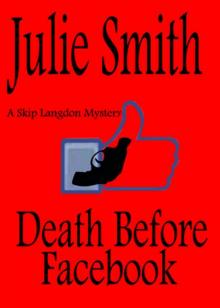 Death Before Facebook (Skip Langdon #4) (Skip Langdon Mystery) (The Skip Langdon Series)
Death Before Facebook (Skip Langdon #4) (Skip Langdon Mystery) (The Skip Langdon Series) P.I. On A Hot Tin Roof
P.I. On A Hot Tin Roof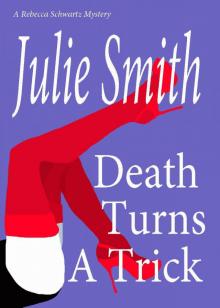 Death Turns A Trick (Rebecca Schwartz #1) (A Rebecca Schwartz Mystery) (The Rebecca Schwartz Series)
Death Turns A Trick (Rebecca Schwartz #1) (A Rebecca Schwartz Mystery) (The Rebecca Schwartz Series) The Axeman's Jazz (Skip Langdon Mystery Series #2) (The Skip Langdon Series)
The Axeman's Jazz (Skip Langdon Mystery Series #2) (The Skip Langdon Series)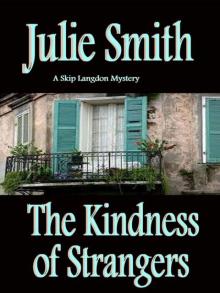 The Kindness of Strangers (Skip Langdon Mystery #6) (The Skip Langdon Series)
The Kindness of Strangers (Skip Langdon Mystery #6) (The Skip Langdon Series)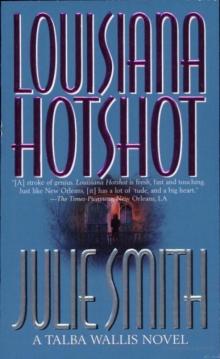 Louisiana Hotshot
Louisiana Hotshot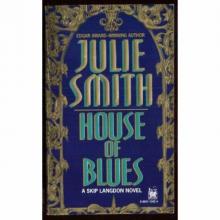 House of Blues
House of Blues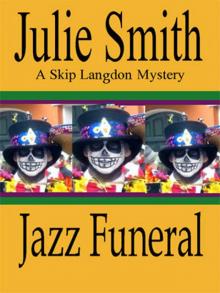 Jazz Funeral (Skip Langdon #3) (Skip Langdon Mystery) (The Skip Langdon Series)
Jazz Funeral (Skip Langdon #3) (Skip Langdon Mystery) (The Skip Langdon Series) Tourist Trap (Rebecca Schwartz #3) (A Rebecca Schwartz Mystery) (The Rebecca Schwartz Series)
Tourist Trap (Rebecca Schwartz #3) (A Rebecca Schwartz Mystery) (The Rebecca Schwartz Series)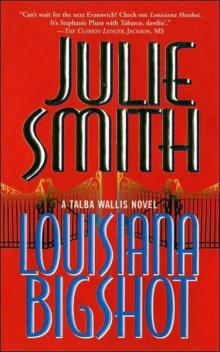 Louisiana Bigshot
Louisiana Bigshot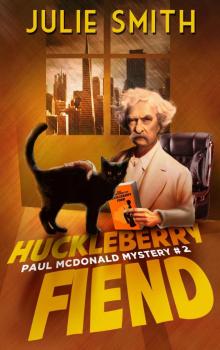 Huckleberry Fiend
Huckleberry Fiend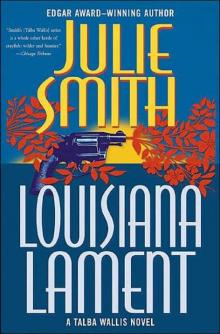 Louisiana Lament
Louisiana Lament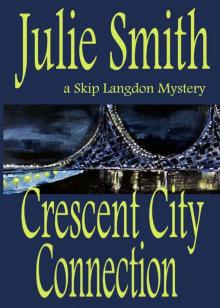 Crescent City Connection (Skip Langdon Mystery #7) (The Skip Langdon Series)
Crescent City Connection (Skip Langdon Mystery #7) (The Skip Langdon Series)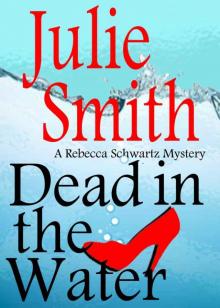 Dead In The Water (Rebecca Schwartz Mystery #4) (The Rebecca Schwartz Series)
Dead In The Water (Rebecca Schwartz Mystery #4) (The Rebecca Schwartz Series)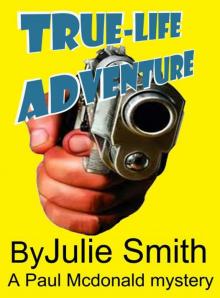 True-Life Adventure
True-Life Adventure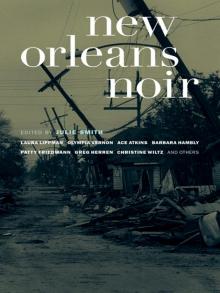 New Orleans Noir
New Orleans Noir